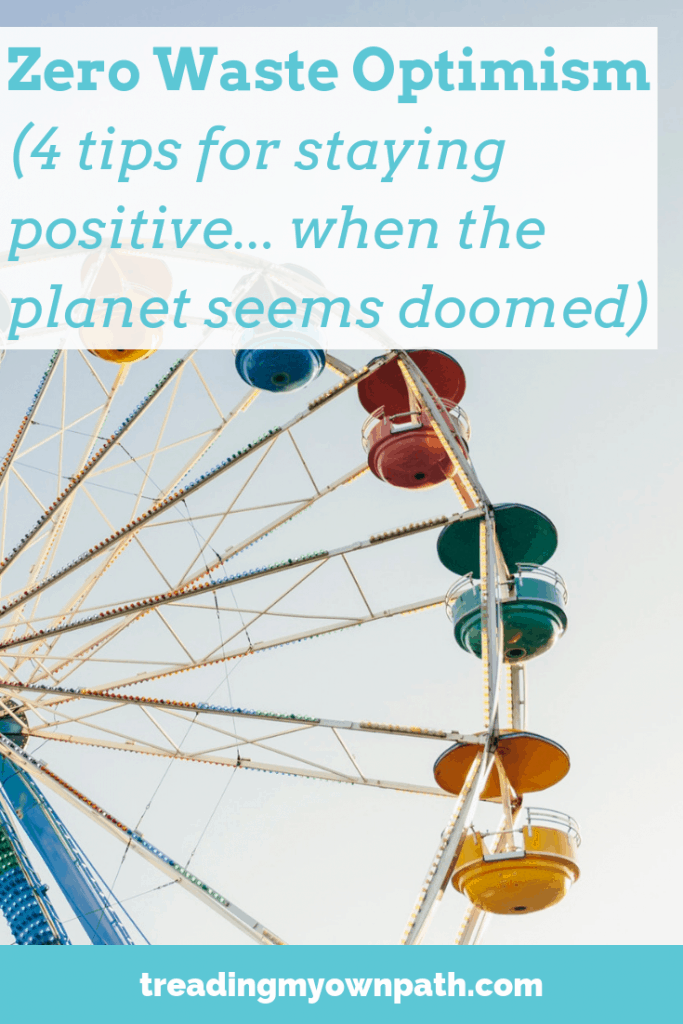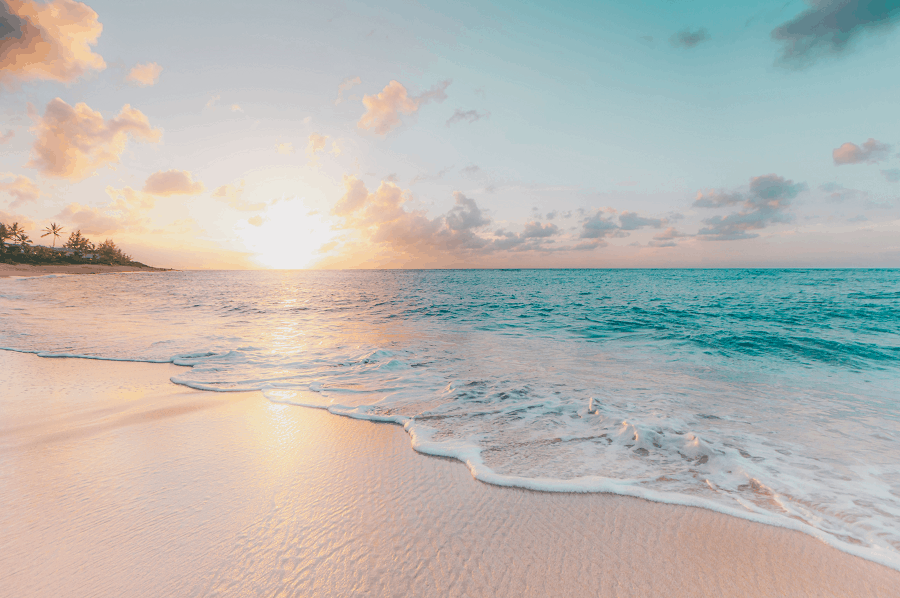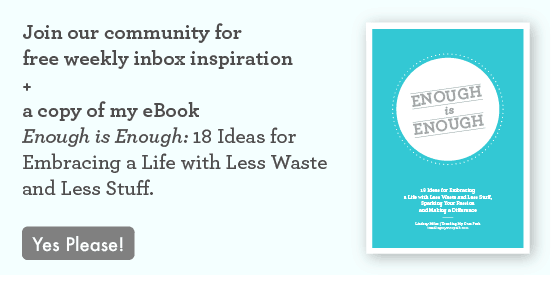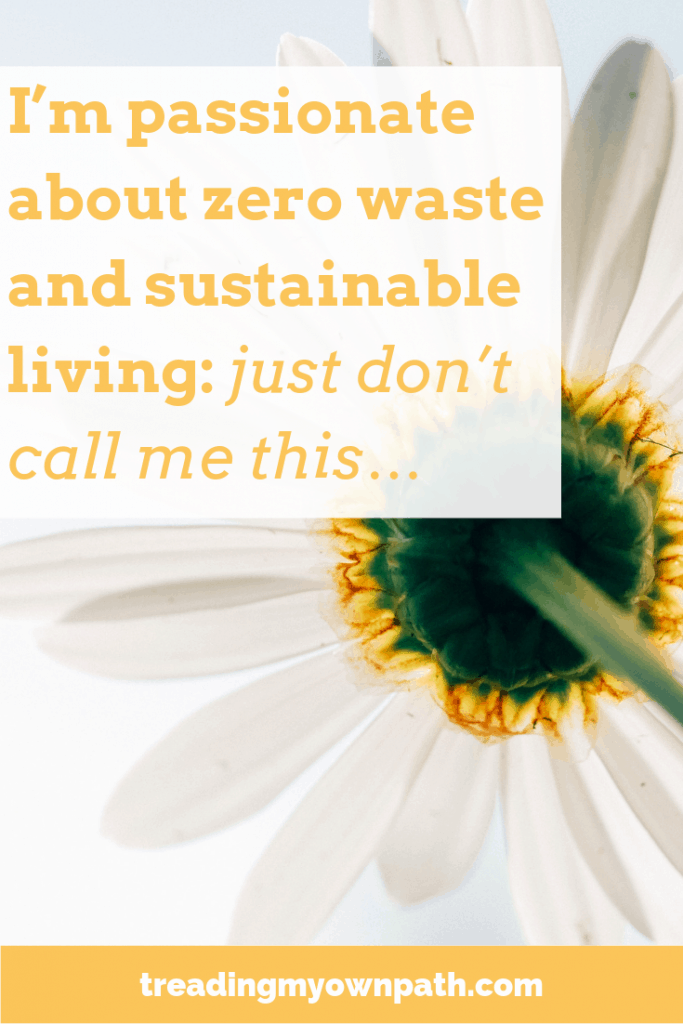Zero Waste Optimism (4 Tips for Staying Positive When The Planet Seems Doomed)
A question I’ve been asked a lot recently is “how do you stay positive?” It’s a fair question. After all, there are plenty of reasons we might despair. Pollution or litter or carbon emissions; the attitudes of governments and political leaders; or the lack of awareness, interest or action on the parts of businesses, organizations and even our friends and family.
Yes, it’s frustrating. Probably the most frustrating thing is not in seeing the problems, but in knowing that there are solutions and yet not seeing change being adopted on the scale it needs to be.
Despite this, I stay positive. That’s not to say I never have moments of doubt or despair, but on the whole, I’d say I’m an optimist. Here’s how I do it.

1. Optimism… or What?
I consider there to be three options. Optimism, indifference, or pessimism. Which translate as: we think that everything will be okay in the end, we simply don’t care, or we think that everything is doomed.
I’m not even sure that I consider this to be a choice. I do care: about the planet, about wildlife, about people, about fairness and equality and doing the right thing.
And if I do care, I can either think that everything will be okay, or that we’re doomed. I can either think that the planet is worth fighting for, that change is worth pursuing, that working towards making the world a better place is a goal worthy of my time and effort… or I can just give up.
And if I give up, if I turn my back on all the things that I care about: well, I don’t actually want to think about what that looks like. It’s not an option I want to entertain.
That’s not to say that I think I’m some kind of superhero or that the future of the planet is in my hands. I know I’m not the only one who cares, I’m not the only one trying to do what they can. It’s not to say that without me the planet is actually doomed (!).
But if there are two choices – one being we ‘win’, and start living sustainably on this one planet that we have – and the other being we ‘lose’, sea levels rise, the oceans fill with plastic and we make ourselves extinct – well, I know which team I want to be on.
Whatever happens, I need to be able to say, hand on heart, that I did something. Knowing that the only way to be on the winning team is to be a part of it keeps me optimistic.
2. Taking Action and Working on Projects
I find projects that get the message out into the community are the best way to keep myself motivated.
For the first six months that I went plastic-free I was very much focused on my own journey, learning skills and creating new habits for myself. After that, I was keen to figure out how to share my knowledge, get involved with the wider community… and I haven’t stopped since.
Over the next seven years, I started this blog and I started giving talks and running workshops. I got involved with my local council running a waste-free event, I worked on the Plastic Free July campaign. I co-started a community fruit tree project and community composting hub, and I set up a community dishes library.
None of these things are ground-breaking or world-changing, but they all contribute to bringing about change nonetheless. Connecting with others, sharing ideas, creating opportunity.
Even by sharing one blog post, or giving a talk to a handful of people, or starting a small project; you never know who you’re going to reach and what influence you’re going to have.
Ideas are like ripples and they spread. I share these things in the hope that others will adopt them, share them, make them better and together we will increase our impact.
Knowing that I’m contributing to something bigger than me and my personal waste or footprint helps keep me optimistic. And always having a project on the go, no matter how small, keeps my fire burning.

3. Remembering Where I Started
When it comes to staying positive, another thing that helps me is remembering where I started.
I’ve always considered myself to be someone who cared about the planet, but I know there was a time when:
- I asked for an extra plastic straw in my drink;
- I purchased fast fashion;
- I snaffled all the freebies regardless of whether I’d use them or not or how pointless they were or how much packaging they came wrapped in;
- I chucked every bit of food waste in the bin;
- I was in love with recycling (and saw that chasing arrows symbol on any packaging as a ‘get out of jail free’ card absolving me of any personal responsibility);
- I felt almost smug about the fact that I owned reusable shopping bags and only took a plastic bag when I needed something to line my bin.
(I’m sure there’s plenty more examples.)
I cared but I was totally disconnected to the impact my personal actions were having, and embarrassingly unaware that actually, my personal actions and my voice are exactly where my power comes from.
I thought it was up to others to change: governments, businesses, organisations. I didn’t realise that I have the power to influence, to champion, to hold to account, to share, and to take a better path every single day through the choices I make.
I believe that when you know better, you do better. If you don’t realise something is a problem, why would you do things differently?
I hold onto these memories of myself and know that if I can change, other people can change too. I like to believe the best of people, and I think that most people want to do the right thing. They just aren’t aware of the impact that their actions have, sometimes.
4. Looking back as well as forward
Lastly, I think it’s important not to focus on the task ahead so much that we forget to look back at what we have achieved and how far we have come. There’s been so much change in the last 7 years and when I think at how much perceptions have shifted, it feels incredibly humbling.
When I first took part in Plastic Free July in 2012, I was one of 400 participants. Last year 120 million people took part in 177 different countries.
Governments across the world are legislating to ban plastic bags, plastic cutlery, styrofoam, food waste to landfill and more.
Change is happening. I know that sometimes it doesn’t feel fast enough, but actually, it’s kind of incredible that we’ve done so much already.
When I think about how far we’ve come, I can only feel optimistic about what will happen in the future.
Now I’d love to hear from you! Do you consider yourself to be a pessimist or an optimist? What do you struggle with most? What tips do you have for staying positive? How has your outlook shifted over time? Anything else you’d like to add? Please share your thoughts below!






